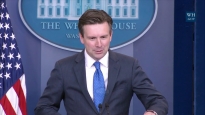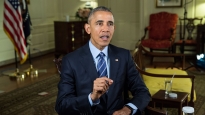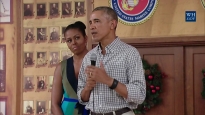President Obama Speaks about Health Reform in Iowa City
March 25, 2010 | 29:15 | Public Domain
President Obama visits the place where he first announced his plan for health care reform back in May of 2007, sharing with a large crowd the immediate effects of health reform for small businesses and families.
Remarks by the President on Health Insurance Reform, University of Iowa Field House, Iowa City, Iowa
1:08 P.M. CDT
THE PRESIDENT: Hello, Iowa! (Applause.) Are you fired up? (Applause.) Oh, it is good to be back in Iowa. (Applause.) I got to take off my jacket when I'm in Iowa. (Applause.) It is good to be back in Iowa. It’s a little colder than it is in D.C., I got to admit. (Laughter.) But I can feel spring coming.
I want to make a couple of acknowledgements. First of all, University of Iowa President Dr. Sally Mason and the entire Hawkeye community, thanks for hosting us. (Applause.) The outstanding governor of the great state of Iowa, Chet Culver and First Lady Mari Culver. (Applause.) There he is back there.
A couple of great friends, Lieutenant Governor Patty Judge. (Applause.) The cochairs of my campaign here in Iowa, Attorney General Tom Miller and Treasurer Mike Fitzgerald. (Applause.) The former governor of Iowa who is now I think going to end up being one of the greatest Secretaries of Agriculture in history, Tom Vilsack is in the house. (Applause.)
I want to acknowledge Iowa City Mayor Matt Hayek. (Applause.) The entire Iowa delegation could not be here because they are still busy finishing business, crossing “T’s” and dotting “I’s” in Washington. But I want every single person to know that this celebration would not be happening if it were not for your members of Congress, Leonard Boswell, Bruce Braley, your own personal congressman, Dave Loebsack -- (applause) -- and Senator Tom Harkin. (Applause.)
Now, thank you Secretary Sebelius for the introduction, but more importantly, for all the amazing and tireless work that you’ve done to make health care reform a reality. I, too, feel your pain because in my bracket -- (laughter) -- I had Kansas winning it all. I feel a little bitter. The President of Northern Ireland came here and he was just, big smile, he was gloating -- (laughter and applause) -- I now -- I’m sold. I want to congratulate all the Northern Iowa fans in this part of the state on their big win. (Applause.) And since you ruined my bracket I'm rooting for you now. I want you to just go ahead and take it. (Laughter.) Go all the way.
I also want to start things off -- oh, there’s one other thing. Some of you know that I have a military aide that travels with me wherever I go. This is one of the things the President does, is carries a big satchel with all kinds of important stuff in there. And the military aide I have with me today is a guy named Lieutenant Colonel Dave Kalinske. And Dave was strong safety for the Hawkeyes. (Applause.) There he is right there -- there’s Dave Kalinske. (Applause.) Strong safety. See, that briefcase is big so you got to have a former strong safety carrying it. (Laughter.)
I want to start off by telling folks here how inspired that I’ve been by your continued resilience in the wake of the floods that devastated this region a few years back. And I remember traveling here right after they happened and how tough things were.
I know -- I know the rebuilding has been difficult, but you should know that you always have a committed partner in this administration to support the road to recovery. (Applause.) And we know that Iowa City is going to be as good as new and better; Cedar Rapids, all across the state we're seeing that rebuilding take place.
So it’s just good to be back in Iowa. This is the state that first believed in our campaign. (Applause.) When all the pundits had written us off, when we were down in the polls, this is the state that inspired us to keep on going, even when the path was uncertain. And because of you, this is the place where change began. (Applause.)
Three years ago, I came here to this campus to make a promise. Just a few months into our campaign, I stood at the University of Iowa hospital right around the corner and I promised that by the end of my first term in office, I would sign legislation to reform our health insurance system. (Applause.)
On Tuesday, after a year of debate, a century of trying, after so many of you shared your stories and your heartaches and your hopes, that promise was finally fulfilled. (Applause.) And today, health insurance reform is the law of the land all across America. (Applause.)
AUDIENCE: Yes we did! Yes we did! Yes we did! Yes we did! Yes we did! Yes we did! Yes we did!
THE PRESIDENT: Yes, we did. Yes, we did. Just like the campaign that led us here, this historic change didn’t start in Washington. It began in places like Iowa City, places just like this, with Americans just like you.
It began when people had the courage to stand up in town hall meetings and talk about how insurance companies were denying their families coverage because of a preexisting condition.
It began when folks wrote letters about how premium hikes of 40 and 50 and a hundred percent were forcing them to give up their insurance.
It began when countless small business owners and families and doctors shared stories about a health care system that works better for the insurance industry than it does for the American people.
So this is your victory, because when the special interests sent an army of lobbyists to Congress, they blanketed the airwaves with millions of dollars of negative ads, you mobilized and you organized and you refused to give up. And when the pundits were obsessing over who was up and who was down and how is this affecting the Obama administration and what’s going on over in the House, you never lost sight of what was right and what was wrong. You knew this was not about the fortunes of one party -- this was about the future of our country. (Applause.) And today, because of what you did, that future looks stronger and more hopeful and brighter than it has in some time -- because of you. (Applause.)
Three years ago, we made a promise. That promise has been kept. Of course -- of course, over the last year, there’s been a lot of misinformation spread about health care reform. There’s been plenty of fear-mongering, plenty of overheated rhetoric. You turn on the news, you’ll see the same folks are still shouting about there’s going to be an end of the world because this bill passed. (Laughter.) I’m not exaggerating. Leaders of the Republican Party, they called the passage of this bill “Armageddon.” (Laughter.) Armageddon. “End of freedom as we know it.”
So after I signed the bill, I looked around to see if there any -- (laughter) -- asteroids falling or -- (applause) -- some cracks opening up in the Earth. (Laughter.) It turned out it was a nice day. (Laughter.) Birds were chirping. Folks were strolling down the Mall. People still have their doctors.
From this day forward, all of the cynics, all the naysayers -- they’re going to have to confront the reality of what this reform is and what it isn’t. They’ll have to finally acknowledge this isn’t a government takeover of our health care system. They’ll see that if Americans like their doctor, they’ll be keeping their doctor. You like your plan? You’ll be keeping your plan. No one is taking that away from you. Three months from now, six months from now you’re going to look around. You’re going to be sitting in a doctor’s office reading through the old People magazines. (Laughter.) And you’ll say, hey, this is the same doctor, same plan. It wasn’t Armageddon.
What this reform does is build on the system of private health insurance that we already have. So does that mean that it’s going to solve every health care problem that we have? No. But it finally tells -- oops, it looks like somebody may have fainted. That happens sometimes in the crowd. Just give him some space. If the medics can make sure to check on them, in the meantime just make sure that they’ve got some air. And if anybody has some water down there, that’d be great. They’ll be all right.
But here’s what the bill does. It finally tells the insurance companies that in exchange for all the new customers they’re about to get, they’ve got to start playing by a new set of rules that treats everybody honestly and treats everybody fairly. (Applause.) The days of the insurance industry running roughshod over the American people are over.
So if you already -- if you already have insurance, this reform will make it more secure and more affordable. If you can’t afford insurance right now or if you’ve been denied coverage -- and I'll bet there are some folks here who don't have insurance or can’t afford it or have been denied coverage -- you’re going to finally be able to get it. Costs will come down for families, and businesses, and the federal government, reducing our deficit by more than $1 trillion over the next two decades. That’s what reform is going to do. (Applause.)
Now, it’s going to take about four years to implement this entire plan -- because we’ve got to do it responsibly and we need to do it right. So I just want to be clear: that means that health care costs won’t go down overnight; not all the changes are going to be in place; there are still going to be aspects of the health care system that are very frustrating over the next several years.
But we have built into law all sorts of measures that in the years to come, health care inflation, which has been rising about three times as fast as people’s wages, is finally going to start slowing down. We’ll start reducing the waste in the system, from unnecessary tests to unwarranted insurance subsidies. So that over time, Americans are going to save money.
And meanwhile, there are a set of reforms that begin to take into effect this year, so I want to talk about this. This year, millions of small business owners will be eligible for tax credits that will help them cover the cost of insurance for their employees. (Applause.) This year, millions of small businesses will benefit.
So let me talk to you about what this means for a business like your own Prairie Lights Bookstore downtown. (Applause.) This is a small business that’s been offering coverage to their full-time employees for the last 20 years. Last year their premiums went up 35 percent, which made it a lot harder for them to offer the same coverage. On Tuesday, I was joined at the bill signing by Ryan Smith, who runs a small business with five employees. His premiums are going up too. He’s worried about having to stop offering health insurance to his workers.
So starting now, small business owners like Ryan and the folks at Prairie Light, they’re going to have the security of knowing that they’ll qualify for a tax credit that covers up to 35 percent of their employees’ health insurance. (Applause.) Starting today, starting today, small business owners -- (applause) -- so starting today, small business owners can sit down at the end of the week, look at their expenses, and they can begin calculating how much money they’re going to save. And maybe they can even use those savings to not only provide insurance but also create jobs. This health care tax credit is pro-jobs, it is pro-business, and it starts this year, and it’s starting because of you. (Applause.)
Starting this year, tens of thousands of uninsured Americans with a preexisting condition and parents whose children have a preexisting condition will finally be able to purchase the coverage they need. (Applause.)
On Tuesday, right after I signed the bill, I met David Gallagher, whose daughter Lauren had written me a letter last year. And when Lauren’s mom lost her job, the entire family lost their health insurance. And when they tried to get new insurance, David was denied coverage because he once had a complication-free hernia surgery.
So Lauren’s been worried sick about what would happen if her father became ill or injured. But now, because of this reform, David Gallagher can finally have access to health insurance again. That starts this year -- because of you and the work that you did. (Applause.)
This year, insurance companies will no longer be able to drop people’s coverage when they get sick, or place lifetime limits or restrictive annual limits on the amount of care they can receive. (Applause.)
This year, all new insurance plans will be required to offer free preventive care. And by the way, for all the students who are here today -- (applause) -- starting this year, if you don’t have insurance or if you’re about to graduate and you’re not sure what your next job is going to be or there’s a little gap between getting that job with insurance, all new plans and some current ones will allow you to stay on your parents’ insurance policy until you’re 26 years old, starting this year. (Applause.) Because as you start your lives and your careers, the last thing you should worry about is whether you go broke just because you get sick.
This year, for the seniors who are in the audience, if you fall in the coverage gap known as the doughnut hole, you’re going to receive $250 to help pay for prescriptions, which will be the first step toward closing that doughnut hole, that gap completely. (Applause.) And I want seniors to know that despite what some have said, these reforms will not cut your guaranteed benefits. In fact, under this law, Americans on Medicare will receive free preventive care without co-payments and deductibles.
Darlyne Neff is here today. She’s a breast cancer survivor. She has fought her heart out for reform over the last few years. Today, the preventive care she needs will finally be covered without charge. That’s what this reform will do. That’s what’s happening because of you. (Applause.)
And once this reform is implemented, then health insurance exchanges are going to be created. This is the core -- the core aspect of this bill that is going to be so important to Americans who are looking for coverage. Basically, we set up a competitive marketplace where people without insurance, small businesses, people who were having to pay through the teeth because they’re just buying insurance on their own, maybe you’re self-employed -- you’re finally going to be able to purchase quality, affordable, health insurance because you’re going to be part of a big pool -- by the way, with members of Congress. So you will be able to get the same good deal that they’re getting, because if you’re paying their salary, you should have health insurance that’s at least as good as theirs. (Applause.)
That’s what’s going to happen in the next few years. And when this exchange is up and running, millions of people are going to be getting tax breaks to help them afford coverage. And the credits add up to the largest middle class tax cut for health care in history.
This is a -- that’s the basic aspects of reform.
AUDIENCE MEMBER: What about the public option?
THE PRESIDENT: That’s not in it.
AUDIENCE MEMBER: Why not?
THE PRESIDENT: Because we couldn’t get it through Congress, that’s why. So they -- let’s -- there’s no need to shout, young man, no need to shout.
Thirty-two people -- 32 million people are going to have health insurance because of this legislation. That’s what this work is about. (Applause.) So that’s what’s going to happen.
Now, I want to just make this point. This legislation is not perfect, as you just heard. (Laughter.) This young man is dissatisfied with an aspect of it, which is fine. I mean, that’s part of what democracy is about. But what this is, is a historic step to enshrine the principle that everybody gets health care coverage in this country, every single person. (Applause.)
And it’s absolutely true -- it’s absolutely true this is a middle-of-the-road bill. This isn’t single-payer, which some people wanted. It’s also not what the Republicans were looking for, which was basically to deregulate the insurance industry, arguing that somehow this would cut down costs -- something that defies the experience of everybody who’s dealt with an insurance company out there. (Laughter.)
So, yes, this is a common-sense bill. It doesn’t do everything that everybody wants, but it moves us in the direction of universal health care coverage in this country and that's why everybody here fought so hard for it. (Applause.)
This is the reform that some folks in Washington are still hollering about, still shouting about. Now that they passed it -- now that we passed it, they’re already promising to repeal it. They’re actually going to run on a platform of repeal in November. You’ve been hearing that. And my attitude is: Go for it. (Applause.)
If these congressmen in Washington want to come here in Iowa and tell small business owners that they plan to take away their tax credits and essentially raise their taxes, be my guest. If they want to look Lauren Gallagher in the eye and tell her they plan to take away her father’s health insurance, that’s their right. If they want to make Darlyne Neff pay more money for her check-ups, her mammograms, they can run on that platform. If this young man out here thinks this is a bad bill, he can run to repeal it. If they want to have that fight, we can have it. Because I don’t believe that the American people are going to put the insurance industry back in the driver’s seat. We’ve already been there. We're not going back. This country is moving forward. (Applause.)
The road to this victory, Iowa, has been long, it has been difficult. It’s a struggle that a lot of brave Americans have waged for years. For others, like our friend Ted Kennedy, it’s a struggle that was waged for nearly a lifetime. (Applause.)
But what this struggle has taught us -- about ourselves and about this country -- is so much bigger than any one issue, because it’s reminded us what so many of us learned all those months ago on a cold January night here in Iowa, and that’s that change is never easy, but it’s always possible. (Applause.) It comes not from the halls of power, but from the hearts of our people. Amid setbacks, it requires perseverance. Amid calls for delay, it requires the fierce urgency of now. In the face of unrelenting cynicism, it requires unyielding hope.
And when I came here three years ago, I told the story of when Lyndon Johnson stood with Harry Truman and signed Medicare into law. That wasn’t perfect either. I’m sure there was somebody who was dissatisfied with it at the time. And as he looked out over the crowd in Independence, Missouri, that day, he said, “History shapes men, but it is a necessary faith of leadership that men can shape history.”
What this generation has proven today is that we still have the power to shape history. (Applause.) In the United States of America, it is still a necessary faith that our destiny is written by us, not for us. Our future is what we make it. Our future is what we make it. Look, this is not the end of difficult times for America. From creating jobs to reducing deficits to making sure every child has a decent education, we still face enormous challenges in this country. And as we meet those challenges, we’re going to face more resistance. We’re going to face more doubt, we’re going to face more cynicism. We’re going to hear more voices who will warn us that we’re reaching too far, that we’re going too fast; who are going to tell us that we can’t, who are going to just make wild accusations about what we’re trying to do.
And when that happens, we’ve got to remember the promise that we have already fulfilled, and the people who fulfilled it, and the generations before us who made it possible. We’re going to have to respond with the creed that continues to define the character of this country we love, and it’s my favorite memory of Iowa, that creed that says: Yes, we can. (Applause.)
Iowa -- yes, we did, because of you. (Applause.) And it’s because of you that we are going to keep on going to make sure that we fulfill every promise to every child in this country for a brighter future. Thank you. God bless you. And God bless the United States of America. (Applause.)
END
1:37 P.M. CDT
|
January 3, 2017
|
December 31, 2016
|
December 27, 2016
|
December 27, 2016
|
|
December 26, 2016
|
December 24, 2016
|
December 21, 2016
|
December 17, 2016
|
- &lsaquo previous
- 1
- 2
- 3
- 4
- 5
- 6
- 7
- 8
- 9
- …
- next &rsaquo







